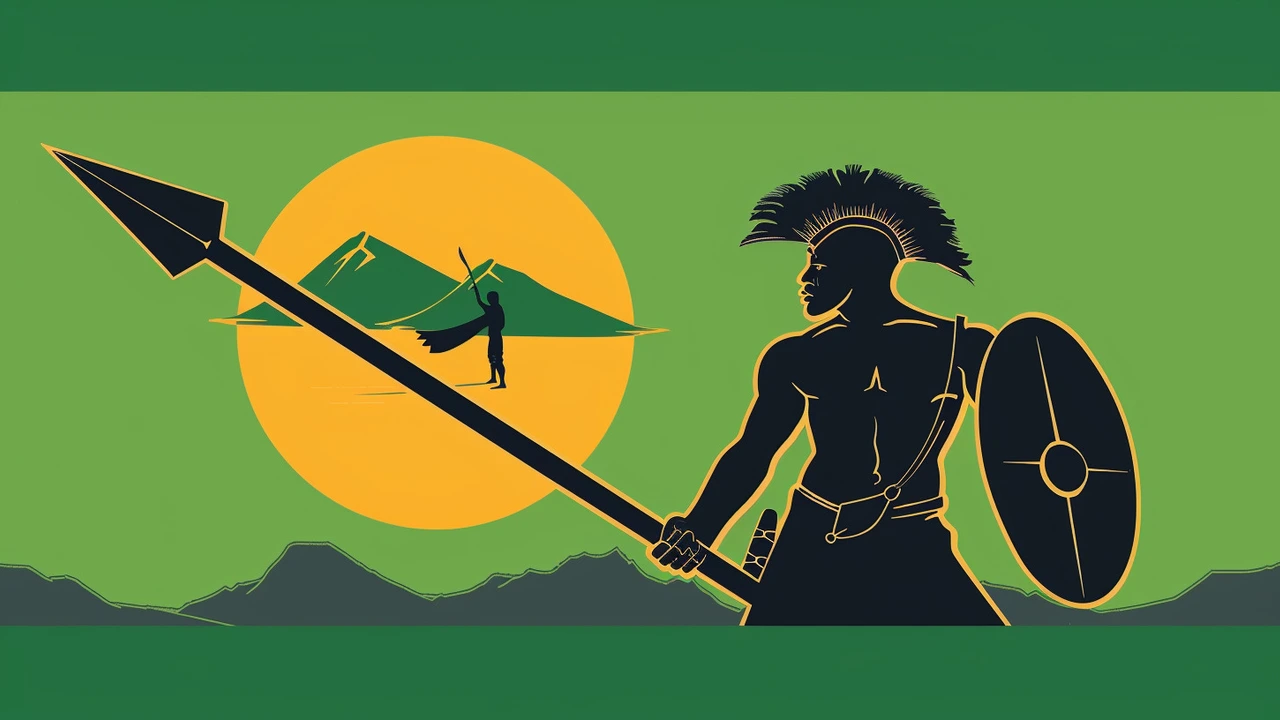Jacob Zuma's New Political Venture
In South Africa's ever-evolving political landscape, former President Jacob Zuma's latest move could potentially alter the balance of power. His newly established party, uMkhonto we Sizwe (MK), is not just another minor player in the political arena. It has strategically zeroed in on Kwazulu-Natal, a province that has historically been a stronghold for the ruling African National Congress (ANC) since the end of apartheid in 1994.
The stakes are high. Kwazulu-Natal holds a special significance for both parties. For the ANC, it's a testament to decades of political dominance, and for Zuma, it's personal. Born in this very province and being an ethnic Zulu, Zuma enjoys a reverential status among many of the local populace. This connection has given his new party a solid foundation to build upon.
Campaign Strategies and Ground Realities
The streets of KwaXimba, a rural area in Kwazulu-Natal, provide a vivid picture of the current political tussle. The sight of rival party tents set up outside a local school—now a polling station—symbolizes the growing contention. Both the ANC and MK are pulling out all the stops to woo early voters. Party anthems blare from speakers as campaigners engage with the public, creating an electrified atmosphere.
This intensified campaigning is not just a show of strength; it's a necessity. Many residents in KwaXimba are increasingly disillusioned with the ANC's performance. Complaints about unreliable water and electricity supplies are common, and these basic utility shortages are eroding the ANC's once-ironclad support. MK has seized upon these grievances, promising better management and more efficient services, which resonates deeply with frustrated voters.

Emerging Tensions and Election Day Drama
The emergence of MK has not just widened the political arena but has also amplified tensions in Kwazulu-Natal. The province is no stranger to political violence, and the rivalry between MK and the ANC adds another layer of complexity. Election day in areas like KwaXimba proceeded relatively smoothly, but there was an undeniable undercurrent of tension. Reports surfaced about alleged threats from ANC supporters directed at voters and misinformation campaigns aimed at undermining MK.
The ANC has categorically denied any wrongdoing. Still, the charged atmosphere indicated a deep-seated anxiety about the potential outcome. The electoral battle in Kwazulu-Natal carries significant ramifications. Should MK, as some opinion polls suggest, secure the majority of votes, it would mark the ANC's worst electoral performance in nearly three decades—a development that would send shockwaves through the political establishment.
Family Feuds and National Implications
This electoral battle is more than a political contest; it's a familial rift with national implications. The division between Zuma and the ANC has extended beyond the political realm, causing splits within families in Kwazulu-Natal. President Cyril Ramaphosa's warnings about new parties attempting to erode ANC support reflect the party's apprehensions. He has been vocal, urging voters to remain loyal, stating that these new factions lack the capacity to effect meaningful change.
However, as MK gains ground, these warnings seem increasingly desperate. The party's focus on localized issues and its promise to redress the failings attributed to the ANC have found a receptive audience. The familial connections and deep-rooted local ties of Zuma further bolster MK's appeal.

The Road Ahead for MK and ANC
The evolving dynamic between MK and the ANC sets the stage for a dramatic and uncertain future. Even as votes are tallied and results begin to trickle in, the broader implications of this electoral contest are becoming clear. This is not merely about one province or one man; it's about the shifting sands of South African politics.
The ANC, once the unchallenged political behemoth, now faces a challenge unlike any before. Jacob Zuma's MK is not just an electoral rival but a reminder of the ANC's internal fractures and the growing discontent among its traditional voter base. If MK succeeds in Kwazulu-Natal, it could serve as a blueprint for similar movements across other provinces, further challenging the ANC's authority.
Conclusion: A New Dawn or a Temporary Blip?
As South Africa watches the unfolding drama in Kwazulu-Natal, the question remains whether MK's rise signals a new political dawn or a temporary disruption. For the residents of KwaXimba and other parts of the province, the answer will depend on how effectively MK can translate its promises into action and whether the ANC can recover lost ground.
The next few months will be telling. As the dust settles from the elections, both parties will have to reassess their strategies. The ANC's dominance has been challenged, and the political landscape of Kwazulu-Natal—and by extension, South Africa—stands on the brink of significant change. One thing is clear: the status quo has been disrupted, and the reverberations will be felt for a long time to come.

Rajesh Soni
May 29, 2024 AT 18:26So Jacob Zuma rolls out MK and suddenly KwaZulu-Natal looks like a chessboard for the ANC’s grandmaster moves – except the pieces are now wielding campaign promises about water and electricity like they're hot commodities on a futures market. I mean, the strategic focus on utility delivery is classic political Jargon 101: promising the obvious to capture the disillusioned voter base. It’s almost impressive how quickly the narrative shifted from “Zuma’s legacy” to “service delivery” without a single policy paper in sight. Still, there’s a certain charm in seeing a former president turn into a grassroots campaign manager; it’s like watching a veteran quarterback call plays from the locker room. In any case, the stakes are high, but the rollout feels like a textbook case of political rebranding mixed with a dash of opportunistic timing.
Nanda Dyah
May 29, 2024 AT 18:35It is evident from the foregoing discourse that the emergence of uMkhonto we Sizwe (MK) necessitates a rigorous appraisal of the incumbent party's operational efficacy, particularly concerning essential public services. The data points presented herein delineate a clear correlation between citizen disenchantment and the substantive promises proffered by MK. In accordance with established political theory, the reallocation of electoral allegiance within the province is foreseeable under these conditions. Consequently, stakeholders are advised to monitor legislative developments pertaining to infrastructure provisioning. Such vigilance will ensure an informed electorate capable of discerning substantive policy proposals from mere rhetorical devices.
vikas duhun
May 29, 2024 AT 19:00Wow, the drama in KwaXimba could give a telenovela a run for its money!
Nathan Rodan
May 29, 2024 AT 19:50Alright, let’s unpack this whole situation because there are layers here that deserve some thoughtful discussion. First, the historical context: the ANC has held KwaZulu-Natal for decades, and that institutional memory cannot be dismissed lightly. However, governance fatigue is real, especially when basic services like water and power falter, and people feel the impact in their daily lives. Secondly, Zuma’s personal connection to the province adds a cultural dimension that transcends pure policy – it’s about identity, pride, and a sense of belonging that resonates with many voters.
Now, consider the political strategy of MK. By zeroing in on concrete service failures, the party sidesteps the abstract ideological battles that often dominate national discourse. This tactic is reminiscent of successful local campaigns worldwide, where voters respond more to tangible improvements than grand rhetoric. Moreover, the promise of more efficient management taps into a yearning for accountability that the ANC has struggled to fulfil in recent years.
Thirdly, the tension and reported intimidation tactics should not be brushed aside. While the ANC denies wrongdoing, the atmosphere of fear can suppress democratic expression, which is antithetical to the very principles they claim to uphold. This underscores the need for transparent oversight mechanisms during elections to ensure that every voice is heard without coercion.
From a broader perspective, if MK manages to secure a decisive victory in KwaZulu-Natal, it could serve as a blueprint for opposition movements in other provinces. The ripple effect might encourage more regionally focused parties to challenge the ANC’s hegemony, potentially reshaping South Africa’s political landscape in profound ways.
Finally, the road ahead for both entities is fraught with challenges. The ANC will need to introspect, rebuild trust, and perhaps even reinvent its approach to service delivery to stay relevant. Meanwhile, MK must transition from campaign promises to actual policy implementation; otherwise, they risk being dismissed as a fleeting phenomenon.
In sum, this election cycle is a pivotal moment that could redefine power dynamics both locally and nationally. It’s a reminder that political dominance is not immutable and that responsive governance remains the ultimate currency in the eyes of the electorate.
KABIR SETHI
May 29, 2024 AT 21:13Interesting take – I think the real test will be whether MK can actually deliver on those service promises once they’re in office.